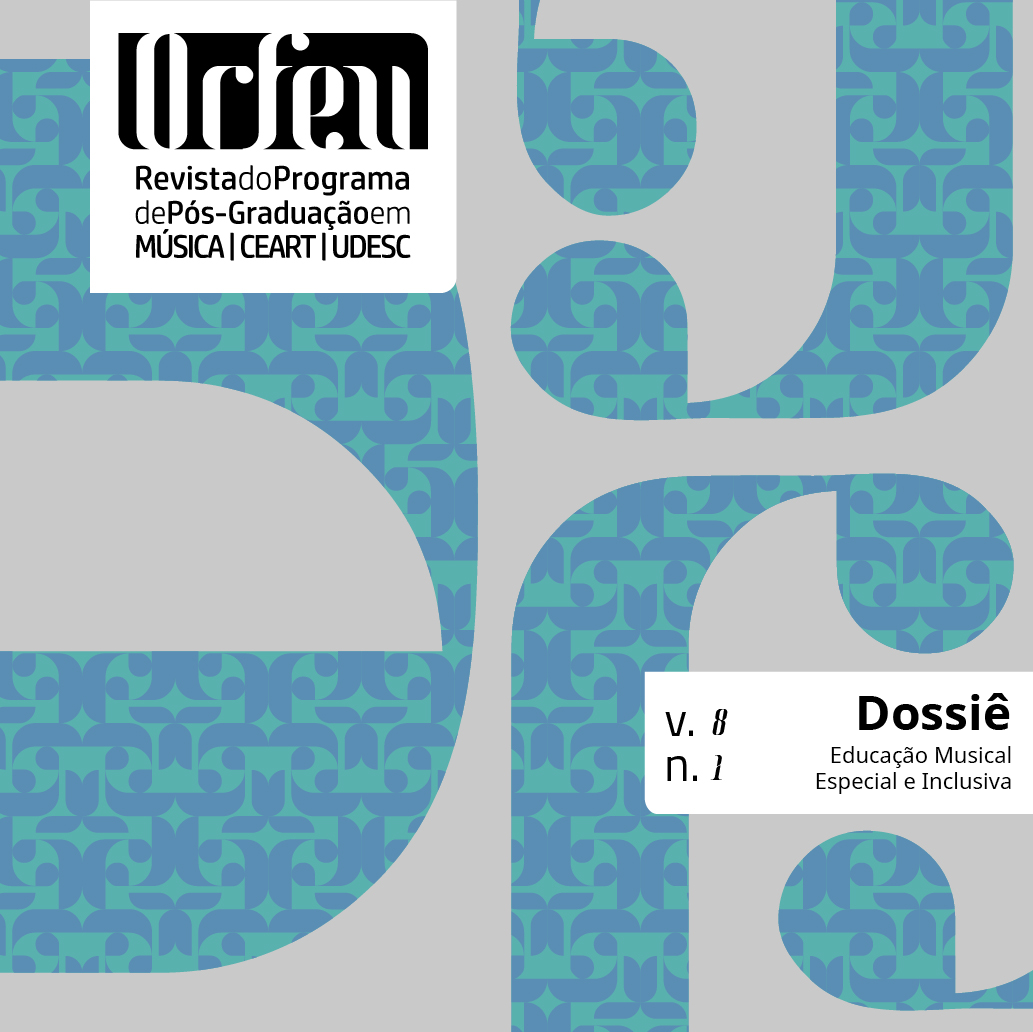Necessary for some, and helpful for all: preparing music educators to reach every student
DOI:
https://doi.org/10.5965/2525530408012023e0110Palavras-chave:
educação musical acessível, formação inicial em música, desenho universal para aprendizagem, diferenciação pedagógicaResumo
A porcentagem de alunos em escolas públicas dos EUA,que são classificados como alunos com deficiência de acordo com a Lei de Educação de Indivíduos comDeficiência (IDEA) tem aumentado constantemente nos últimos anos e continua a crescer. Infelizmente, os educadores musicais não estão preparados adequadamente para ensinar alunos com deficiência. Os programas de formação inicial de professors de música não fornecem no curso, conteúdos na área da pedagogia da educação musical acessível. Os conteúdos fornecidos por estes programas limitam-se aos estudos gerais dos aspectos históricos e legais da educação especial. Como resultado, os professores de música acabam se sentindo frustrados e desanimados quando não conseguem ensinar efetivamente os alunos com deficiência, e os alunos com deficiência são privados de uma aprendizagem musical significativa e de experiências musicais. O campo emergente da educação musical acessível é promissor na área de formação de professores de música. As estratégias pedagógicas, abordagens e estruturas do ensino da educação musical acessível ajudam os educadores a alcançarem todos os alunos – não apenas os alunos com deficiência. Este artigo investiga a educação musical acessível conforme ocorre no nível de graduação em uma instituição nos EUA. Conclui-se com a recomendação de incluir duas ferramentas já conhecidas e baseadas em evidências, de educação musical acessível em programas de preparação de professores de música.
Downloads
Referências
BERNARD, R. Disciplinary Training: The Import and Implications of teacher training programs for the place and content of music education in K-12 public schools in Davis, J. (Ed.) Disjuncture and Discourse: Wherefore the Arts in Higher Education?, 2016.
BERNARD, R. “Charlie on the MTA: Navigating professional development resources for music educators in teaching students with disabilities.” Journal of Art and Special Education 1 (1), Fall, 2019.
BERNARD, R. “Shattering Barriers: Exposing and Understanding the Narratives of Musicians with Disabilities.” In K. Vu and A. de Quadros, (Eds.), My Body was Left on the Street: Music Education and Displacement, 2020.
CAST. About Universal Design for Learning. https://www.cast.org/impact/universaldesign-for-learning-udl . Retrieved March 23, 2023.
COLWELL, C. M. & THOMPSON, L. K. “Inclusion” of information on mainstreaming in undergraduate music education curricula. Journal of Music Therapy, 37(3), 205–221, 2000.
HAALAND, L. K. A phenomenological study of teachers’ experiences of students with learning disabilities in mainstream middle school classrooms (Doctoral dissertation). Available from ProQuest Dissertations & Theses A&I database. (Order No. 3462961), 2011.
HAHN, K. R. Inclusion of students with disabilities: Preparation and practices of music educators (Doctoral dissertation). Available from ProQuest Dissertations & Theses A&I database. (Order No. 3420149), 2010.
HAMMEL, A. M. Preparation for teaching special learners: Twenty years of practice. Journal of Music Teacher Education, 11, 1. From https://journals.sagepub.com/doi/10.1177/105708370101100103, 2001. Retrieved March 23, 2023.
HELLER, L. Undergraduate music teacher preparation for mainstreaming: A survey of music education teacher training institutions in the Great Lakes region of the United States. Unpublished doctoral dissertation, Michigan State University, East Lansing, 1994.
HOURIGAN, R. Preparing music teachers to teach students with special needs. UPDATE, Fall/Winter 2007, 5-14, 2007a.
HOURIGAN, R. A Special Needs Field Experience for Preservice Instrumental Music Educators Author(s): Ryan M. Hourigan Source: Contributions to Music Education, 2007, Vol. 34 (2007), pp. 19-33 Published by: Ohio Music Education Association, 2007b.
HOURIGAN, R. Preservice Music Teachers’ Perceptions of Fieldwork Experiences in a Special Needs Classroom. Journal of Research in Music Education Volume 57 Number 2 July, 2009.
KAISER, K. A., & JOHNSON, K. E. The effect of an interactive experience on music majors’ perceptions of music for deaf students. Journal of Music Therapy, 37(3), 222–234, 2000.
LINSENMEIER, C. V. The impact of music teacher training on the rate and level of involvement of special education students in high school band and choir (Doctoral dissertation). Available from ProQuest Dissertations and Theses A&I database. (Order No. 3159804), 2004.
MAY, B. N., WILLIE, K., WORTHEN, C., & PEHRSON, A. An Analysis of State Music Education Certification and Licensure Practices in the United States. Journal of Music Teacher Education, 27(1), 65–88. From https://doi.org/10.1177/1057083717699650, 2017. Retreived June 25, 2023.
NATIONAL CENTER FOR EDUCATION STATISTICS. Students With Disabilities. Condition of Education. U.S. Department of Education, Institute of Education Sciences. from https://nces.ed.gov/programs/coe/indicator/cgg , 2022. Retrieved March 23, 2023.
NEW AMERICA FOUNDATION. Individuals with Disabilities Education Act—Cost impact on local school districts. Retrieved March 23, 2023, from http://febp.newamerica.net/background-analysis/individuals-disabilities-education-act-costimpact-local-school- districts/print , 2014.
SMITH, F. Educators deal with the growing problem of autism. Edutopia. From https://www.edutopia.org/autism-school-special-needs , 2008, March 19. Retrieved March 23, 2023.
TOMLINSON, C.A. The differentiated classroom: Responding to the needs of all learners. Alexandria, VA: Association for Supervision and Curriculum Development, 2014.
VANWEELDEN, K., & WHIPPLE, J. The effects of field experience on music education majors’ perceptions of music instruction for secondary students with special needs. Journal of Music Teacher Education, 14(2), 62–68, 2005.
VINCIGUERRA, S. Lived experiences of secondary instrumental music teachers who teach students with disabilities (Doctoral dissertation). Available from open.bu. from https://open.bu.edu/handle/2144/16836 , 2016. Retrieved March 23, 2023.
Downloads
Publicado
Como Citar
Edição
Seção
Licença
Copyright (c) 2023 Rhoda Bernard

Este trabalho está licenciado sob uma licença Creative Commons Attribution 4.0 International License.






